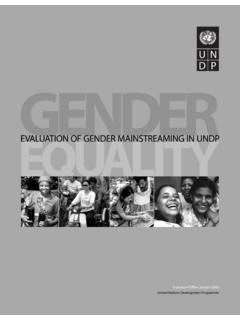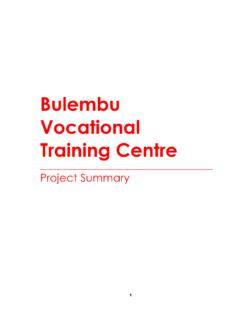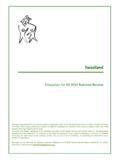Transcription of Federalism in Africa - ideefederale.ca
1 Federalism in AfricaMichel BurgessDirector and Professor of Federal StudiesUniversity of KentJanuary 2012An Essay on the Impacts of Cultural Diversity, Development and DemocracyExecutive summary 3 Introduction 4 Features Peculiar to the African Context 5 The African Federal Experience 7 Post-Colonial Federalism : the 1960s 9 Nigeria: The Causes of Success 13 Nigeria in Comparative Perspective: Success and Failure 17 Conclusion: The Living Legacies of Federalism in Africa 19 CONTENT3 EXECUTIVESUMMARYF ederalism in Africa does not have a positive image. Its record of success is patchy while its failures seem manifest. Currently there are only three established federal political systems among the 54 states in Africa : Nigeria, Ethiopia and South Africa .
2 However, the evident paucity of successful contemporary federal systems must not be allowed to convey the impression that Federalism in Africa is redundant. On the contrary, it continues to resonate as part of a continuing political discourse about the nature of political authority in many formally non-federal states, such as Somalia, Sudan and the Democratic Republic of the Congo. This essay provides a short survey of the African federal experience and demonstrates that historically speaking there have been many federal experiments in the 1960s and 1970s that did not survive but which left many important lessons for African state builders who fought desperately to create new nation states that themselves still struggle to hold together societies which remain deeply in a culture, democracy and development dynamic that continues to this day to shape and mould public perceptions of state-building and national integration across the continent, Federalism has had to adapt and adjust to competing and often conflicting objectives.
3 In Africa the federal idea has been both used and abused in equal measure at different times by a variety of political elites across the continent. Federalism has been championed both as an instrument of unity in diversity within states its intra-state dimension and as a means by which established states have attempted to forge a closer relationship between states the inter-state dimension. The former case has been largely a transient phenomenon with few enduring examples while the latter has had a chequered career in terms of regional, mostly economic, unions of states. The overall impacts of culture, democracy and development on federal experiments have served to illustrate both the versatility and the vulnerability of the federal idea in a continent that has been dominated by both single party and authoritarian military dictatorships in pursuit of nation building projects.
4 These resilient regimes symbolise the obstacles to federal successes and explain the failure of democratisation processes to facilitate the federal idea. The survey concludes by underlining Federalism as having living legacies in Africa that will continue to inspire future innovative constitutional article examines Federalism from a comparative African perspective. It is divided into six short sections. The first section provides an overview of features peculiar to the African situation in general, while the second section introduces what I have called the African federal experience which refers briefly to the different types of federal experiments attempted and their consequences. Section three draws attention to the critical post-colonial efforts in the 1960s to establish federations and federal-type unions while section four provides a short detailed case study of the Federal Republic of Nigeria.
5 Section five sets the Nigerian case in a comparative African context and section six brings the survey to an appropriate conclusion with an assessment of cultural diversity, democracy and development. Before we proceed with our task, it is helpful to make some preliminary remarks about the nature of Federalism itself as a political concept and how it must be handled in the specific context of Africa . In the mainstream literature on Federalism it is broadly accepted that Federalism often encapsulated in the federal idea refers to the recognition of difference and diversity in its many forms as the driving force of federation the federal state which is the tangible institutional expression of this idea. Put simply, then, difference and diversity produce Federalism and Federalism produces federation.
6 But just as there are several different kinds of state, so there are many varieties of Federalism and federation. Indeed, it is perfectly possible to have Federalism without formal federation for the simple reason that some federalisms do not necessarily achieve fully-fledged federation but instead produce highly decentralised states that allow considerable local autonomy. The distinguishing feature of federation is the constitutional entrenchment of autonomy in some policy-making spheres as well as guaranteed representation in the central institutional decision-making processes. And the main difference between a federation and a confederation is that broadly in the former case different orders of government have a direct impact upon a single people (the demos) in the state while in the latter case no single state exists but only a union of states.
7 Consequently decisions impact only upon the constituent states in the union and not directly upon the peoples (the demoi). In a confederation the general government impacts the population only indirectly through its constituent governments. These preliminary observations are important when we come to look at the African federal experience. Sometimes we will refer to intra-state Federalism , meaning relations within the federal state, and sometimes to inter-state Federalism , referring to relations between states which come close to the confederal type arrangements we have just outlined above. It will also become apparent as we proceed that there are many variations on the federal theme which never conform rigidly to neat definitions or conceptual analysis.
8 If we are determined to adhere strictly to neat and tidy definitions therefore we will have great difficulty in finding any examples to study in Africa . The African world is not neat and tidy when it comes to federal experiments. On the contrary, it is untidy and messy. And part of the reason for this has to do with features peculiar to the African PECULIAR TO ThE AFRICAN CONTEXTIt is important that we are aware not only of the wide social heterogeneity that exists throughout African societies but also of an historical past which endures in terms of different forms of traditional governance. In Africa power centres existed around kinship groups or around kingships and sometimes the political units became quite large. The relation of other authorities in the area to the ruler of the system was however one of subordination.
9 Sometimes that subordination was total where the local ruler was a tool and loyal servant of the central ruler, as in Benin and Nigeria, where every citizen was known as an Oba s man . Sometimes the subordination was a more indirect one, typified in relations of feudal allegiance, as in the Hausa relation of Chapa of a local ruler to a bigger Emir or to Sarkin Musulmi, the ruler of the Sokoto Caliphate in northern Nigeria. Sometimes the relationship was a loose one symbolised by the rendering of annual tribute, or occasionally by some important ceremonial (FR.)ALGERIAFRENCHCENTRALAFRICAC TE D ORSUDANABYSSINIABELGIANCONGOSOUTH AFRICAN UNIONMOZAMBIQUEMADAGASCARTOGOLIBERIASIER RA LEONEGUINEA (SPAIN)S O TOM CABINDA (PORT.)NORTHERNRHODESIASOUTHERNRHODESIAN YASSALANDMAURITIUS( )SEYCHELLES( )ZANZIBAR( )COMORES(FR.)
10 REUNION(FR.)SWAZILANDBASUTOLANDGERMANEAS TAFRICAWALVIS BAY( )SOCOTRA( )CAMEROONERYTREABRITISHEASTAFRICAUGANDAS OMALIA (ITAL.)NIGERIARIO DE OROGAMBIAGUINEA (PORT.)TANGERTUNISIAMOROCCO(SPAIN)MEDITE RRANEAN SEASOMALIA(BRIT.)SOMALISFRENCH COASTANGOLASOUTHWESTAFRICA123 FRENCH WEST AFRICA4567891110 BECHUANALANDINDIANOCEANP ortuguese OccupancySpanish OccupancyIndependantCountriesInternation alZoneItalian OccupancyGerman OccupancyRegion exchanged in the 1911 agreement with FranceBritish OccupancyBritishDominionBritish Sphereof InfluenceAnglo-EgyptianCondominiumBelgia nOccupancyFrench OccupancyATLANTICOCEAN1. Southern territory2. Mauritania3. Senegal4. Guinea5. Upper Senegal and Niger6. C te d Ivoire7. Dahomey8. Niger military terr.





